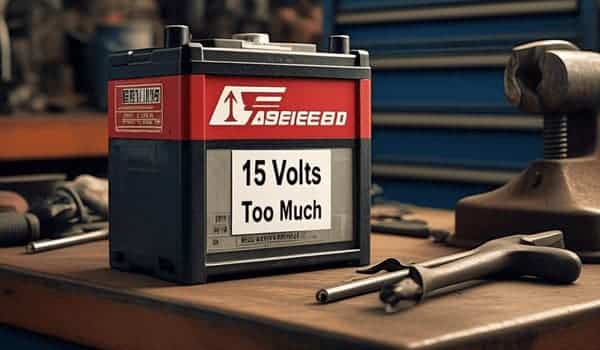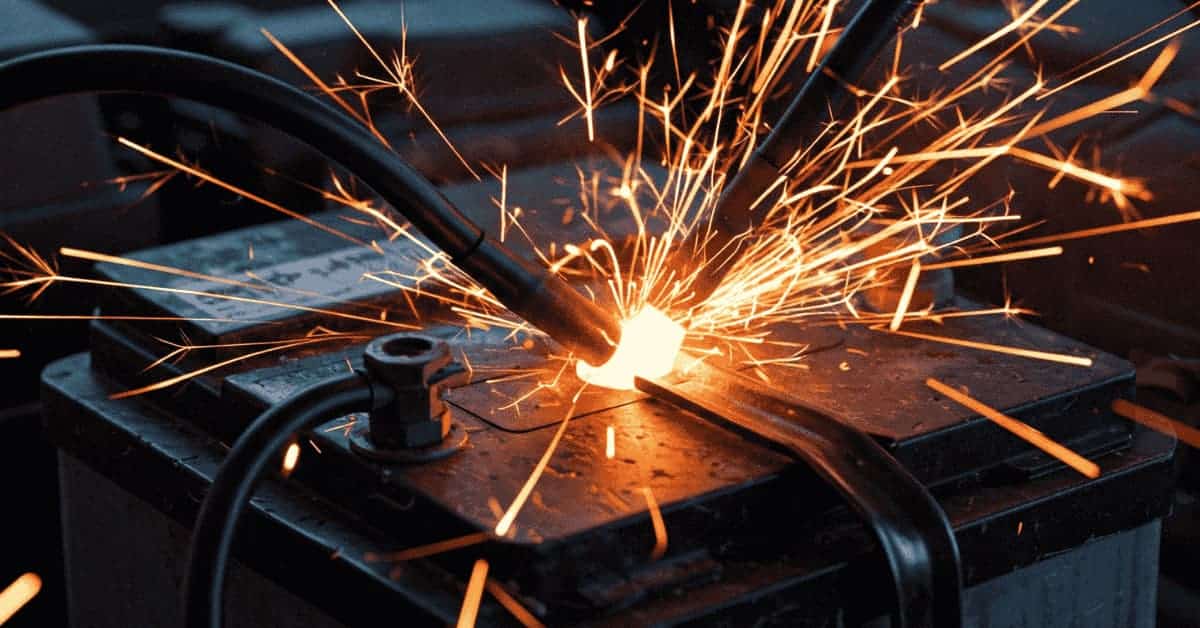If your car battery voltage too high, it’s like giving it too much of something nice. Instead of improving your car’s performance, it can actually cause problems. The battery can soon wear out, other car parts can be damaged, and in some scary cases, even explode. Let’s find out why this happens and how to avoid it.
What Is The Normal Voltage of A Car Battery?
A healthy car battery should typically have a resting voltage of around 12.6 volts when the engine is off. When you start the car, a part called the alternator starts working. The alternator is like a little power-making machine that recharges the battery while you drive. When the engine runs and the alternator charges the battery, the voltage usually rises between 13.5 and 14.5 volts.
If the voltage is lower than usual, that’s a different problem. It means your battery might be weak or not charging properly.
Understanding High Voltage In Car Batteries
What does ” too high” mean for a car battery? If the voltage stays above 15 volts for a long time, things can start to go wrong. It’s like turning the water pressure in that hose way too high—it might start to leak or even burst!
The words “high voltage” can sound scary, like those big power lines you see way up high. But in your car, it’s not that much power. Still, it’s enough to cause trouble if it’s too high for too long.
There’s the alternator that makes the power, a little helper called the voltage regulator that tries to keep the power level just right, and all the tiny rooms inside the battery called cells.
Why Would a Car Battery Get Too Much Power?
How does a car battery end up with too much voltage? Here are a few reasons.
1. Alternator Failure
Remember that power-making machine, the alternator? If it doesn’t work properly, it can send too much power to the battery. It’s like a water pump that gets stuck on “full explosion” when we don’t want it.
2. The voltage regulator is Broken
The voltage regulator is a small part that stops the alternator from making too much power. If it breaks, the alternator can send out too much electricity.
3. Loose Wires
Loose or dirty battery wires can block the flow of power and increase the voltage, like a kink in a water hose building up pressure.
4. Wrong Charger
A mismatched battery charger pumps too much power into your car battery, overcharging it. It’s like trying to fill a small balloon with a giant air pump—the pressure is simply too great!
5. Cold Weather Weirdness
In cold weather, your car’s battery charger might act strangely when you start the car. The power (we call it voltage) might go a little higher for a short time. But don’t worry—it should come back down to normal pretty fast. It’s just warming up a bit!
Is 15 Volts Too Much For A Car Battery?

Your car has a system to keep the battery charged while the engine runs. With the alternator, the system usually sends about 13.8 to 14.0 volts to the battery, and it’s normal.
When the voltage rises to 15 volts, it’s like giving the battery too much power. It can make the battery do something called gassing. Gassing happens when the stuff inside the battery (electrolyte with water or H2O) breaks down into gas. Gas is H2 and O2. Too much gas is harmful to the battery. It can damage the plates inside. These plates have material on them, and too much gassing can make this plate material come off (flaking), decreasing how long your battery will life. So, gassing too much is a bad idea.
A good regulated charger knows when the battery is full (completely charged). It will then send less power (around 13.5 to 13.8 volts) to prevent overcharging and too much gassing. If the voltage stays at 15 volts, it means the battery is getting too much charge (overcharging). If you have a sealed battery, this can quickly destroy it.
Be careful! The gas from an overcharging battery can be very dangerous. It’s a highly explosive mixture. Keep sparks away from the battery if it’s gassing or for a little while afterward. Explosions from batteries can be very bad, sending out stuff and acid.
So, 15 volts is definitely too high for your car battery. It can cause serious damage and even be dangerous. If you see voltage this high when the engine is running, it’s important to have your car checked.
How To Check If Your Car Battery Voltage Is Too High
If you think your battery voltage might be too high, there are ways to check.
1. Using a Multimeter
This is a special tool that measures the voltage of your battery. Someone who knows how to use it can touch the little probes to the battery posts, and it will show the reading on a screen.
2. Checking the Alternator
Sometimes, we need to test the alternator itself to see if it’s putting out too much power.
3. OBD-II Scanner
Many cars have a special plug that allows you to connect a scanner. The scanner can read information from the car’s computer, including the battery voltage.
4. Smart Battery Monitors
Some newer cars have built-in systems that monitor the battery and can tell you if the voltage is too high right on the dashboard.
What Can Go Wrong If Battery Voltage Too High?
If your car battery keeps getting too much power, it can cause some serious problems for you and your car:
1. Shorter Battery Life
Just like if you keep overcharging your phone, the battery will eventually wear out faster, too much voltage can make your car battery die sooner than it should. That means you’ll have to buy a new one sooner!
2. Messing Up Other Car Parts
All the electrical parts in your car, like the main computer (sometimes we call it the ECM), the little sensors that tell the car what’s going on, and the safety switches called fuses, are made to work with just the right amount of power. Too much voltage can fry them, like when you put too much electricity into a light bulb and it burns out. These parts can be expensive to fix!
3. Boom! (Maybe)
In very rare cases, if the voltage gets high, there’s a small chance the battery could explode or catch fire. That’s why we need to be careful and fix high-voltage problems quickly to keep everyone safe.
How Do You Fix Too Much Voltage In A Car Battery?
If you find that the car battery has too much voltage, here’s what you may need to do:
1. Check and Change the Alternator/Regulator
If the alternator or the voltage regulator is broken, we’ll probably need to replace it. That’s usually the main reason we see for high-voltage problems.
2. Clean the Wires
Make sure all the wires connected to your battery are clean and tight. Loose or dirty connections can mess things up for us.
3. Use the Right Charger
If you are using a separate charger, make sure it’s the right one for your type of battery. Using the wrong charger can pump too much power and cause damage.
4. Get a New Battery
If the high voltage has already damaged your battery, you might need to get a new one. Sometimes, once a battery gets too much power, it can’t return to normal.
FAQs
Can a car battery blow up if the voltage is too high?
Yes, it’s rare, but if the power gets way too high, the battery can get super hot and maybe even explode. That’s why we need to take high voltage seriously.
Is it dangerous to drive if my car battery has too much voltage?
Yes, it can be dangerous. It can damage important parts of your car and even start a fire. If your battery has too much power, you should ask a grown-up to get it checked by a mechanic immediately.
Can the weather change my car battery’s voltage levels?
Really cold weather can sometimes cause the voltage reading to be a little higher for a short time when you first start the car, but it shouldn’t stay high. Hot weather can also make the battery work harder.
How Car Battery Power Compares to Other Batteries
Other batteries use a wide variety of chemistry, including lithium-ion (various subtypes like Lithium Cobalt Oxide, Lithium Iron Phosphate, etc.), Nickel-Metal Hydride (NiMH), Nickel-Cadmium (NiCd), and alkaline. Each chemistry offers different characteristics in terms of energy density, lifespan, safety, and cost.
Finally
So, keeping your car battery voltage in that just-right spot, usually between 13.7 and 14.7 volts when you’re driving, is super important for your car.
Too much power can damage the battery and other parts of your car—we don’t want that to happen! Regularly checking your car and ensuring the charging system works correctly can help you avoid these problems. This keeps your car running well for longer, so everyone can travel safely.







